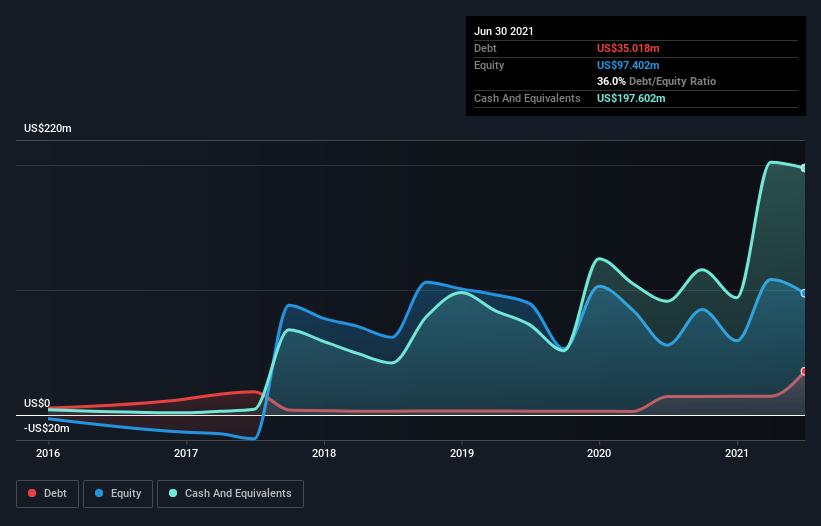
Legendary fund manager Li Lu (who Charlie Munger backed) once said, 'The biggest investment risk is not the volatility of prices, but whether you will suffer a permanent loss of capital.' So it might be obvious that you need to consider debt, when you think about how risky any given stock is, because too much debt can sink a company. We can see that Molecular Templates, Inc. (NASDAQ:MTEM) does use debt in its business. But is this debt a concern to shareholders?
When Is Debt Dangerous?
Debt and other liabilities become risky for a business when it cannot easily fulfill those obligations, either with free cash flow or by raising capital at an attractive price. In the worst case scenario, a company can go bankrupt if it cannot pay its creditors. However, a more common (but still painful) scenario is that it has to raise new equity capital at a low price, thus permanently diluting shareholders. By replacing dilution, though, debt can be an extremely good tool for businesses that need capital to invest in growth at high rates of return. When we think about a company's use of debt, we first look at cash and debt together.
See our latest analysis for Molecular Templates
What Is Molecular Templates's Debt?
The image below, which you can click on for greater detail, shows that at June 2021 Molecular Templates had debt of US$35.0m, up from US$14.7m in one year. However, its balance sheet shows it holds US$197.6m in cash, so it actually has US$162.6m net cash.

How Healthy Is Molecular Templates' Balance Sheet?
The latest balance sheet data shows that Molecular Templates had liabilities of US$44.7m due within a year, and liabilities of US$102.7m falling due after that. Offsetting these obligations, it had cash of US$197.6m as well as receivables valued at US$234.0k due within 12 months. So it can boast US$50.5m more liquid assets than total liabilities.
This short term liquidity is a sign that Molecular Templates could probably pay off its debt with ease, as its balance sheet is far from stretched. Simply put, the fact that Molecular Templates has more cash than debt is arguably a good indication that it can manage its debt safely. There's no doubt that we learn most about debt from the balance sheet. But it is future earnings, more than anything, that will determine Molecular Templates's ability to maintain a healthy balance sheet going forward. So if you're focused on the future you can check out this free report showing analyst profit forecasts.
In the last year Molecular Templates wasn't profitable at an EBIT level, but managed to grow its revenue by 25%, to US$26m. Shareholders probably have their fingers crossed that it can grow its way to profits.
So How Risky Is Molecular Templates?
By their very nature companies that are losing money are more risky than those with a long history of profitability. And in the last year Molecular Templates had an earnings before interest and tax (EBIT) loss, truth be told. Indeed, in that time it burnt through US$30m of cash and made a loss of US$94m. However, it has net cash of US$162.6m, so it has a bit of time before it will need more capital. With very solid revenue growth in the last year, Molecular Templates may be on a path to profitability. By investing before those profits, shareholders take on more risk in the hope of bigger rewards. When analysing debt levels, the balance sheet is the obvious place to start. But ultimately, every company can contain risks that exist outside of the balance sheet. Be aware that Molecular Templates is showing 4 warning signs in our investment analysis , and 1 of those is concerning...
When all is said and done, sometimes its easier to focus on companies that don't even need debt. Readers can access a list of growth stocks with zero net debt 100% free, right now.
If you decide to trade Molecular Templates, use the lowest-cost* platform that is rated #1 Overall by Barron’s, Interactive Brokers. Trade stocks, options, futures, forex, bonds and funds on 135 markets, all from a single integrated account. Promoted
New: Manage All Your Stock Portfolios in One Place
We've created the ultimate portfolio companion for stock investors, and it's free.
• Connect an unlimited number of Portfolios and see your total in one currency
• Be alerted to new Warning Signs or Risks via email or mobile
• Track the Fair Value of your stocks
This article by Simply Wall St is general in nature. We provide commentary based on historical data and analyst forecasts only using an unbiased methodology and our articles are not intended to be financial advice. It does not constitute a recommendation to buy or sell any stock, and does not take account of your objectives, or your financial situation. We aim to bring you long-term focused analysis driven by fundamental data. Note that our analysis may not factor in the latest price-sensitive company announcements or qualitative material. Simply Wall St has no position in any stocks mentioned.
*Interactive Brokers Rated Lowest Cost Broker by StockBrokers.com Annual Online Review 2020
Have feedback on this article? Concerned about the content? Get in touch with us directly. Alternatively, email editorial-team (at) simplywallst.com.
About OTCPK:MTEM
Molecular Templates
A clinical stage biopharmaceutical company, focuses on the discovery and development of biologic therapeutics for the treatment of cancer and other serious diseases in the United States.
Moderate with adequate balance sheet.


